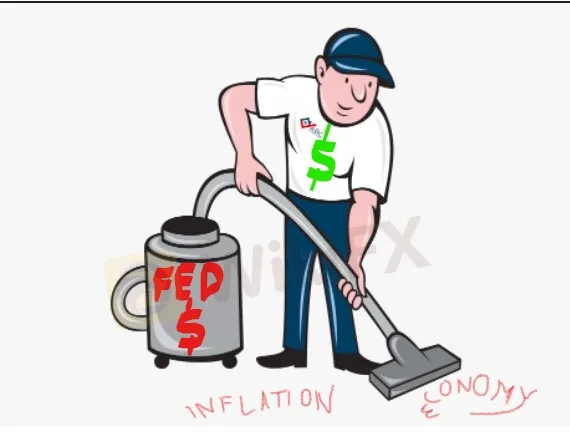简体中文
繁體中文
English
Pусский
日本語
ภาษาไทย
Tiếng Việt
Bahasa Indonesia
Español
हिन्दी
Filippiiniläinen
Français
Deutsch
Português
Türkçe
한국어
العربية
The US Dollar's Vacuum Effect
Abstract:Years of monetary laughing gas have not weakened the US dollar's position as the world reserve currency, but rather strengthened it.
Click Here After You Read:, Trade the possibilities with wikifx.
April 2022 will be a historic day, only seen three times since 1973. A month in which the S&P500 Index and US Treasuries both fell 5%. The US dollar has also risen versus the major trading currencies, reaching a new year high.
Years of monetary hilarity have done nothing to weaken the US dollar as a global reserve currency. We now see the vacuum effect. Dollar inflows during a period of risk aversion.

The PBOC, the Chinese Central Bank, had to give in and allow a rapid devaluation of the yuan, while trying to keep it stable via capital controls and daily fixing. The yuan's weakening is probably intended to stimulate the Chinese economy and reduce yuan-denominated debt. However, it weakens the Chinese yuan's allure as a dollar substitute, as global investors may worry both central bank manipulation and China's capital controls.
Despite increased exports and foreign exchange inflows, several commodity exporting countries' currencies have depreciated versus the US dollar. From the Norwegian krone to big exporter currencies, only the Brazilian real looks to be holding up... It has had several bad years, so it is more of a bounce than an appreciation.
We are experiencing the “vacuum effect” on which we have commented.
In times of ease, the world's central banks pretend to be the Federal Reserve, without the world's reserve currency, legal security, or financial balance. Governments issue more US dollar-denominated debt, anticipating that low rates will make funding big deficits reasonable. This increases global demand for US dollars, not because the Federal Reserve has a restricted policy, but because other fiat currencies are inferior.
It is quite concerning that the ECB is allowing the euro to approach parity with the US dollar due to its obsession with avoiding other central banks' normalization processes. Global demand for euros is declining, as is the trade surplus that sustained the euro. Those who favor a weak euro should face reality. Empirical research suggests that a weak euro does not increase exports, but rather exports higher-value goods. A weak euro means more expensive imports.
As a result of other central banks' recklessness, the US dollar has become the most demanded currency. An inflationary trend that the central banks themselves denied or declared transitory was enough to worry an overconfident market.
The market is plainly weak and risk averse. The impact of the Ukrainian invasion is significant, but monetary in nature. A market that hit historic highs on the basis of aggressive money printing is now in trouble as rate hikes and the end of central bank asset purchases loom.
Fear of interest rate hikes has resulted in only one small rise of 0.25 percent in the US and none in Europe.
The North American economy shrank by 1.4% in the first quarter, prompting economists to lower their forecasts for 2022. At the same time, the European Union's main economies exhibit signs of stagnation or recession, with slow first-quarter growth. China also includes a structural downturn caused by the real estate bubble crash and political involvement in key sectors in the covid-19. After a long period of stagnation, the global economy is finally showing signs of recovery. To avoid rising inflation, central banks will have to borrow from nations that refuse to address their imbalances.
Many expected the US dollar to fall and traders to flee to other currencies. In a “fire”, the US dollar is the residence with the most windows and doors. Other central banks' reckless policies make a fiat world alternative unfeasible. Will bitcoins take over? Maybe, but it's distant.
Disclaimer:
The views in this article only represent the author's personal views, and do not constitute investment advice on this platform. This platform does not guarantee the accuracy, completeness and timeliness of the information in the article, and will not be liable for any loss caused by the use of or reliance on the information in the article.
Read more

Axi Bids AUD 52M to Acquire Low-Cost Broker SelfWealth, Outbidding Competitor Bell Financial
This acquisition attempt by AxiCorp Financial Services Pty Ltd, Axi’s parent company, values SelfWealth at AUD 0.23 per share and is notably higher than a recent bid made by Bell Financial Group Limited (ASX), which offered AUD 0.22 per share.

Italy’s CONSOB Blocks Seven Unregistered Financial Websites
Italy’s CONSOB ordered seven unauthorized investment websites blocked, urging investors to exercise caution to avoid fraud. Learn more about their latest actions.

CySEC Warns Against Unauthorized Investment Firms in Cyprus
CySEC warns investors about unregulated investment firms in Cyprus. Verify broker reliability through the WikiFX app to stay protected from scams.

STARTRADER Issues Alerts on Fake Sites and Unauthorized Apps
STARTRADER warns against counterfeit sites and apps using its brand name. Protect yourself by recognizing official channels to avoid fraudulent schemes.
WikiFX Broker
Latest News
CySEC Warns Against Unauthorized Investment Firms in Cyprus
Why Even the Highly Educated Fall Victim to Investment Scams?
Warning Against Globalmarketsbull & Cryptclubmarket
Dukascopy Bank Expands Trading Account Base Currencies
UK Sets Stage for Stablecoin Regulation and Staking Exemption
Axi Bids AUD 52M to Acquire Low-Cost Broker SelfWealth, Outbidding Competitor Bell Financial
Crypto Influencer's Body Found Months After Kidnapping
STARTRADER Issues Alerts on Fake Sites and Unauthorized Apps
Italy’s CONSOB Blocks Seven Unregistered Financial Websites
Bitfinex Hacker Ilya Lichtenstein Sentenced to 5 Years in Prison
Currency Calculator


